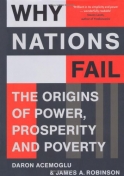BKMT READING GUIDES
Why Nations Fail
by Daron Acemoglu
Hardcover : 464 pages
1 club reading this now
0 members have read this book
Introduction
This is a provocative new theory of political economy explaining why the world is divided into nations with wildly differing levels of prosperity. Why are some nations more prosperous than others? "Why Nations Fail" sets out to answer this question, with a compelling and elegantly argued new theory: that it is not down to climate, geography or culture, but because of institutions. Drawing on an extraordinary range of contemporary and historical examples, from ancient Rome through the Tudors to modern-day China, leading academics Daron Acemoglu and James A. Robinson show that to invest and prosper, people need to know that if they work hard, they can make money and actually keep it - and this means sound institutions that allow virtuous circles of innovation, expansion and peace. Based on fifteen years of research, and answering the competing arguments of authors ranging from Max Weber to Jeffrey Sachs and Jared Diamond, Acemoglu and Robinson step boldly into the territory of Francis Fukuyama and Ian Morris. They blend economics, politics, history and current affairs to provide a new, powerful and persuasive way of understanding wealth and poverty. They offer a pragmatic basis for the hope that at 'critical junctures' in history, those mired in poverty can be placed on the path to prosperity - with important consequences for our views on everything from the role of aid to the future of China.
Guest Reviewer: Charles C. Mann on Why Nations Fail
 Charles C. Mann, a correspondent for The Atlantic, Science, and Wired, has written for Fortune, The New York Times, Smithsonian, Technology Review, Vanity Fair, and The Washington Post, as well as for the TV network HBO and the series Law & Order. A three-time National Magazine Award finalist, he is the recipient of writing awards from the American Bar Association, the American Institute of Physics, the Alfred P. Sloan Foundation, and the Lannan Foundation. His 1491 won the National Academies Communication Award for the best book of the year. He lives in Amherst, Massachusetts.
Charles C. Mann, a correspondent for The Atlantic, Science, and Wired, has written for Fortune, The New York Times, Smithsonian, Technology Review, Vanity Fair, and The Washington Post, as well as for the TV network HBO and the series Law & Order. A three-time National Magazine Award finalist, he is the recipient of writing awards from the American Bar Association, the American Institute of Physics, the Alfred P. Sloan Foundation, and the Lannan Foundation. His 1491 won the National Academies Communication Award for the best book of the year. He lives in Amherst, Massachusetts. A few years ago, while I was researching a book on the history of globalization, I suddenly realized that I was seeing the same two names on a lot of the smartest stuff I was reading. The names belonged to two economists, Daron Acemoglu and James Robinson. Much of their work focused on a single question: Why are poor places poor, and is there something we can do about it?
This is one of the most important questions imaginable in economics?indeed, in the world today. It is also one of the most politically fraught. In working on my book, I read numerous attempts by economists, historians and other researchers to explain why most of North America and Europe is wealthy and why most of Asia, Africa and Latin America is not. But these usually boiled down to claims that rich nations had won the game by cheating poor places or that poor places had inherently inferior cultures (or locations) which prevented them from rising. Conservative economists used the discussion as a chance to extol the wide-open markets they already believed in; liberal economists used it to make the attacks on unrestrained capitalism they were already making. And all too often both seemed wildly ignorant of history. I can?t recall encountering another subject on which so many people expended so much energy to generate so little light.
Acemoglu and Robinson were in another category entirely. They assembled what is, in effect, a gigantic, super-complete database of every country's history, and used it to ask questions?wicked smart questions. They found unexpected answers?ones that may not satisfy partisans of either side, but have the ring of truth.
Why Nations Fail is full of astounding stories. I ended up carrying the book around, asking friends, ?Did you know this?? The stories make it a pleasure to read. More important, though, Acemoglu and Robinson changed my perspective on how the world works. My suspicion is that I won?t be the only person to say this after reading Why Nations Fail.
Discussion Questions
No discussion questions at this time.Book Club Recommendations
Recommended to book clubs by 0 of 0 members.
Book Club HQ to over 90,000+ book clubs and ready to welcome yours.
Get free weekly updates on top club picks, book giveaways, author events and more








